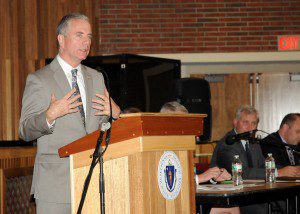
State Rep. Harold P. Naughton, Jr, addresses the audience during the meeting of the Massachusetts Military Asset and Security Strategy Task Force at the 1st Lt. Charles W. Whitcomb Middle School on Thursday. (U.S. Army National Guard photo by Sgt. Doug Huddy, Massachusetts National Guard Public Affairs/Released)
MARLBOROUGH – The Massachusetts Military Asset and Security Strategy Task Force this week. launched its community support initiative for the Commonwealth’s six military installations. Task Force Executive Director and Policy Advisor to Governor Deval Patrick Adam Freudberg, Major General L. Scott Rice of the Massachusetts National Guard, and Rep. Harold P. Naughton began the event with a discussion about the bases’ importance and how communities can support the installations. The community support initiative aims to unify efforts to promote, enhance, and strategically expand military mission and jobs at all installations in Massachusetts.
“Massachusetts’ military installations, and the innovative defense technology companies linked to them, employ hundreds of thousands of talented individuals, power our state’s economy, and are developing the advanced technology required to protect our nation,” said U.S. Representative and Military Task Force Co-Chair Niki Tsongas. “These bases assuredly have a far-reaching impact, but, just as importantly, play an active role in the well-being and success of the communities in which they are embedded. This event allows military and elected officials, veterans groups, and community representatives to come together and discuss ways the Massachusetts bases and their communities can support each other and grow together.”
“Our six military installations are strategic in our communities on what they do for the nation and the Commonwealth,” said Rice, The Adjutant General of Massachusetts. “What is so critical about these military facilities and the work of the Massachusetts Military Task Force it supports is the fact that 46,000 high-tech people are employed in our communities.”
The event also featured a panel discussion moderated by Tim Murray, President and CEO of the Worcester Regional Chamber of Commerce, to detail the Commonwealth’s Community Innovation Challenge grant opportunity for municipalities to work together to support the mission and people who work at Massachusetts’s military bases. The panel discussion featured Lt. Colonel and Amesbury Mayor Thatcher Kezer, Tim Dodd from the Executive Office of Administration and Finance, MassDevelopment President and CEO Marty Jones, and Secretary of Veterans’ Services Coleman Nee. Kezer spoke to what Task Force efforts mean to the military and, as a municipal official who has seen success in shared services, endorsed regionalization. Dodd provided an overview of the grant opportunity for municipalities, while Jones emphasized how shared services can benefit both municipalities and bases. Finally, Nee discussed how much the community support effort means to the more than 500,000 veterans and military families who live in Massachusetts.
“Our six military bases are incredibly important to the Massachusetts economy. We need to do whatever is possible to stand behind them. Their economic impact is significant and their contribution to our national security cannot be overstated,” said Murray. “The business community is a beneficiary of the military’s presence here in the Commonwealth, and we encourage them to give their full support. Creating a network of community partners from across the state to explore shared services and regionalization opportunities is just the first step.”
“The Commonwealth’s military bases are on the cutting edge of technology and innovation, mirroring the highly intelligent and skilled Massachusetts workforce,” said Jones. “Community support is critical to these bases, and we look forward to working with the municipalities and our partners in the Task Force to showcase this support.”
Last month Secretary of Administration and Finance Glen Shor announced the third round of Community Innovation Challenge (CIC) grants. Building on two successful rounds of CIC grant funding, this round of grants totaling $4 million will help support local government regionalization projects and other initiatives designed to deliver local services more effectively and efficiently. CIC grants provide financial support for one-time or transition costs related to innovative regionalization and other efficiency initiatives in local governments. Since 2012, the Patrick administration has provided $6.25 million to fund 49 unique projects involving 197 cities and towns across the Commonwealth. These projects include facilities management, public safety, public health, education, environmental protection, financial services, information technology, public works, transportation, library services, veterans’ services, and housing.
Regionalization and other efforts to streamline government services have been increasingly important at the local level. Providing municipalities with the resources to collaborate on shared initiatives allows for reduced costs, improved services and increased efficiency. Through programs like the CIC grants, state and local officials are better able to build consensus and increase cooperation necessary to implement regional services. By improving the effectiveness of shared programs and services, the Patrick administration is able to assist municipalities in maximizing the impact of every dollar spent, and in today’s case is focusing on ways to use this opportunity to support military installations in Massachusetts.
In 2012, Governor Patrick supported the Military Asset and Security Strategy Task Force’s creation to assess each installation’s military assets, infrastructure and growth opportunities. The Task Force is co-chaired by Patrick, Tsongas, and former Senator Cowan, and supported by Executive Committee Members Senator Elizabeth Warren and Senator Edward Markey. The six military bases include: Barnes Air National Guard Base; Fort Devens; the U.S. Army’s Natick Soldier Systems Center; Hanscom Air Force Base, Joint Base Cape Cod, and Westover Air Reserve Base.
These installations account for a total economic impact of $14.2 billion and more than 46,500 jobs.

